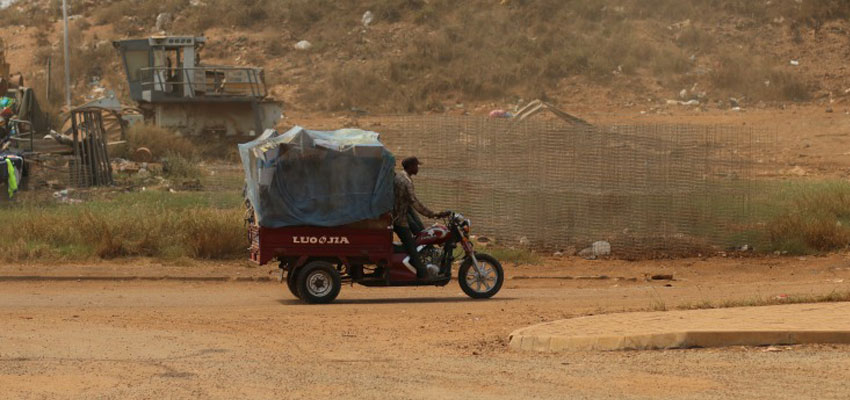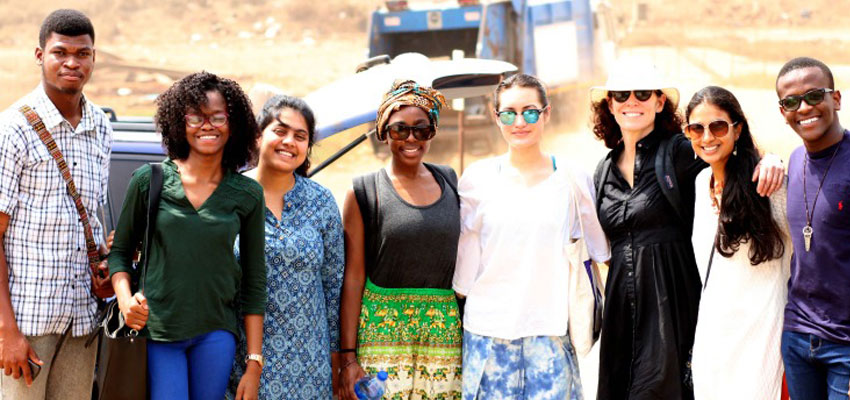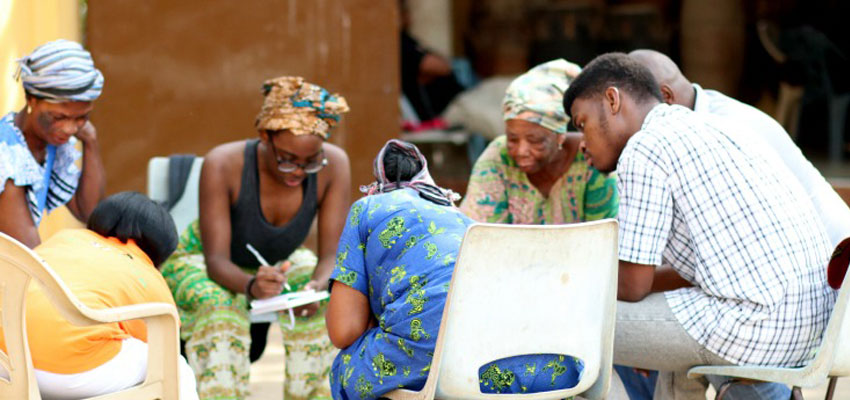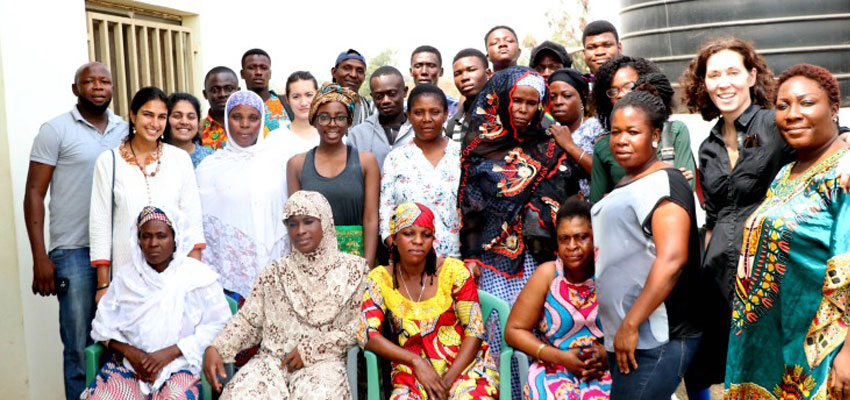
his Jaunary, students from the fall D-Lab: Gender course traveled to Ghana to work with Ashesi University students to conduct research with a community of waste pickers, participating in Pick-It!, an integrated waste management program funded by Fan Milk, Limited, Danone Ecosystem Fund, and FMO (the Dutch Development Bank). The Hewlett Foundation is also supporting the project, through WIEGO. Pick-it is a D-Lab Inclusive Markets project. Following is a blog post from the students who traveled to Ghana:
-------------------------
“We were awestruck by the breadth of innovations in financial inclusion in Ghana. Institutions here went miles above and beyond textbook definitions, uniquely accommodating the complexities in everyday circumstances, and leaving no stone unturned to bring the bank to the people.”
“Amen!” enthused Aunty Efua when D-Lab's Libby McDonald recapped for us why we were all gathered there — four students (Aimee Veneau, Karrisha Gillespie, Sruthi Davuluri, and Raeesa Rane) from MIT D-Lab, local partners from Environment 360, WIEGO, students from Ashesi University, and over 30 women waste-pickers — our chairs arranged in a circle on a veranda at the Tema Palace.
We had convened to continue to work towards building a sustainable enterprise with waste-pickers in the Greater Accra Region. Together, we held dreams of a future where a collective of waste pickers from Kpone and Tema, 26 people strong, would operate a sorting center of their own design and hold ownership in a recycling business that is truly inclusive and fulfilling. We strived for an even stronger community of women entrepreneurs — armed with Pickets, business acumen, and the appropriate financial tools to realize their indomitable potential.
Over the course of this trip, we spoke both with waste-picking communities to gain deeper insights into their financial priorities, challenges, and aspirations, and with financial institutions, microfinance institutes and large private banks alike, to discover what innovative and accessible tools exist in Ghana best suited to this context.

Visits to waste-picking communities
On our first full day in Accra, we visited the waste picking communities at the Kpone landfill and in Tema. We engaged in extended conversations about the waste pickers’ finances in focus groups. Facilitators drew five circles representing food, business, education, health, and recreation on chart paper and analyzed how participants allocated their money (represented by stones) amongst those priorities.
Two truths quickly surfaced at both locations: first, that participants were avid entrepreneurs. Almost every woman in Tema had a side business — they were seamstresses, soap makers, sanitation workers, and fish mongers. In a second iteration of this activity, where facilitators handed out twice as many stones as there were circles, we found that participants invested a hefty percentage of their income specifically towards expanding their businesses. In doing so, they hoped to buy better equipment, take bigger orders, and increase their incomes.

Second, we found that they heavily prioritized saving for their children and for their futures. We watched as they drew their own sixth circle for savings and put aside large portions of their income in it. As crucial as it was to save, conversations revealed that there was a wide range of saving methods used amongst the participants. While the most sophisticated used mobile money and rotating susu (ROSCA) schemes, others had more rudimentary savings tools — some stored money in the ground and it was common to carry savings permanently on their bodies.
Sharing the aspirations and challenges of waste-picking communities with financial institutions
After our initial data gathering exercises, we shared the aspirations and challenges of our waste-picking communities with several financial institutions. We were awestruck by the breadth of innovations in financial inclusion in Ghana. Institutions here went miles above and beyond textbook definitions, uniquely accommodating the complexities in everyday circumstances, and leaving no stone unturned to bring the bank to the people.
Two of the institutions we spoke with had scaled the local daily susu saving scheme across neighborhoods in Accra. They deployed their own vehicles and collectors to go door to door and collect small amounts of money from clients (usually women) in their homes and deposited it in their bank accounts. Not only did they consider mobility restrictions, they also designed personalized schemes around their borrowers’ priorities: for instance, they created plans to pay school fees upfront and allowed their clients to repay gradually and cheaply. They also worked with supply stores to buy school supplies in bulk and offer better prices on those materials to parents. We learned of truly valiant efforts to close knowledge gaps, achieve economies of scale, and reel workers in the informal sector into a secure/formal banking system.

In addition to these meetings, we had a great time testing out products ourselves. We went into Accra scouting out mobile banking kiosks and stores to recreate the process of setting up and operating an account. Several demonstrations, long lines, and lots of questions later, we had gained much richer knowledge of the user experience and better understood the waste pickers’ challenges with this system. We also broke into working groups with the eight wonderful students from Ashesi University and recreated different savings schemes on a micro-level. We pinned up charts and studied how various products held up in comparison. This collaborative and hands-on effort helped lay the ground for our workshop design and planning marathon at Ashesi University.
Planning for a co-design workshop at Ashesi Universtiy
Working with the Ashesi University students at their school was definitely one of the most memorable experiences from this trip. We spent all day planning ahead for the curriculum co-design workshop in March at the beautiful Ashesi Campus. Lined with palm trees and red-roofs and sitting atop a hill, the small peri-urban campus was idyllic and bustling. Distilling the best of our insights, we designed interactive games, activities, and focus groups for the workshop. We shared laughs and many stories over groundnut chicken soup, omo tuo, red red, and mounds of wakye and yam at their school cafeteria, and continued to work until we had most of a plan. Saying goodbye at the end of such an eventful week was bittersweet, but we are so fortunate to have shared this learning experience with each other.
We cannot wait to reunite with the Ashesi students on campus in April for the financial inclusion presentation and panel discussion at MIT D-Lab where we will share our findings with the wider community. Cheers to a wonderful January, and here’s to hoping that the balmy April breeze brings more life and renewed vigor to our project.

